- The Hornets are hosting a group of six prospects for a pre-draft workout on Friday, the team announced in a press release. Led by Eastern Michigan forward and former five-star recruit Emoni Bates, the workout will also include Meechie Johnson Jr. (South Carolina), Jaylen Martin (Overtime Elite), Landers Nolley (Cincinnati), Jalen Slawson (Furman), and Trey Wertz (Notre Dame).
Celtics guard Marcus Smart has won the NBA’s Hustle Award for 2022/23, the league announced in a press release (story via Brian Martin of NBA.com). The 29-year-old also won the award last season, becoming the first back-to-back winner, and has now been the recipient three times in the past five seasons.
This is the seventh season for the Hustle Award, which was created in ’16/17, Martin notes. It is a merit-based award reflective of NBA.com’s hustle stats, including charges drawn, loose balls recovered, deflections, box outs, screen assists and contested shots.
The top-five finishers for the award, in order, were Smart, Warriors forward/center Draymond Green, Pacers forward Aaron Nesmith, Knicks center Mitchell Robinson and Pelicans forward Herbert Jones.
Here are a few more odds and ends from around the basketball world:
- Eric Pincus of Bleacher Report takes a look at the best guards available on the 2023 free agent market and their potential landing spots. Pincus thinks a team with cap room might try to pry restricted free agent Austin Reaves from the Lakers with a large offer sheet, but he thinks L.A. will ultimately match.
- John Hollinger of The Athletic, who used to work for the Grizzlies and was part of the front office that drafted Dillon Brooks, believes the small forward can still be a positive contributor for a number of teams as long as he can toe “The Line” between “competitive and crazy.” Teams over the cap but below the luxury tax line could offer the impending free agent the full mid-level exception, and Hollinger points to the Bulls, Hornets, Mavericks, Kings, Trail Blazers and Hawks as clubs that could use defensive help on the wing. As for teams with cap room, the Pistons, Rockets, Pacers and Jazz might be interested in Brooks if they miss out on pricier targets, according to Hollinger.
- UConn guard Jordan Hawkins has been invited to the NBA draft combine, which takes place later this month, according Adam Zagoria of ZagsBlog.com (Twitter link). Considered one of the best shooters in the 2023 class, Hawkins is a potential lottery pick, currently ranked No. 13 on ESPN’s big board. As Zagoria previously reported, Hawkins will be joining a couple of his teammates (Andre Jackson and Adama Sanogo) at the combine.
The Hornets have begun working out draft prospects as they try to bounce back from a 27-win season. They brought in six prospects on Tuesday — Angelo Allegri (Eastern Washington), Malique Jacobs (Kent State), Jarkel Joiner (NC State), Seneca Knight (Illinois State), Jake Stephens (Chattanooga) and Qudus Wahab (Georgetown), the team’s PR department tweets. Joiner barely makes the cut on ESPN’s Best Available rankings — he ranks No. 100 on the list.
- NBA commissioner Adam Silver defended his suspension of Hornets forward Miles Bridges, which will keep him out of action for just 10 games next season, Shauntel Lowe of The New York Times writes. Bridges, who didn’t play this season, was technically suspended for 30 games for domestic violence but was given credit for 20 games for time served. Silver said crediting Bridges for 20 games seemed like the right thing to do because he missed a year of income.
Rival front offices are expecting Miles Bridges to re-sign with the Hornets this summer, Marc Stein states in his latest Substack article. Bridges, who will be suspended for the first 10 games of next season, didn’t play this year after being charged with felony domestic abuse for a June 2022 incident. Stein adds that in announcing the suspension, commissioner Adam Silver cited a mutual agreement between league officials and Bridges’ representatives at Klutch Sports that resulted in him sitting out the 2022/23 season.
Stein notes that Charlotte has a June 29 deadline to tender a $7.7MM qualifying offer that will make him a restricted free agent. One indication of Bridges’ possible intentions, Stein adds, is an online photo of himself that he recently posted wearing Hornets gear during a workout.
Bridges was expected to be one of the top names on the 2022 free agent market before the domestic abuse case. He became a full-time starter during his fourth NBA season and averaged 20.2 points, 7.0 rebounds and 3.8 assists in 80 games.
There’s more from Stein:
- Ime Udoka, who was hired as the Rockets‘ new head coach last week, was on a similar hiatus from the league. Udoka was suspended for the season by the Celtics following an affair with a subordinate, and although there was no official punishment from the NBA, the league office agreed with the way Boston handled the situation, Stein adds. “The Celtics decided that he should be suspended for a year,” Silver said. “We reviewed that and determined it was fair under those circumstances. And then when other teams — and it wasn’t just the Rockets — asked us if he would be able to coach next season, we said he would be.”
- The Raptors had interest in hiring Udoka to replace Nick Nurse, but they intended to conduct a thorough coaching search that would last well into May, sources tell Stein. When the Rockets made a four-year offer reportedly worth $28.5MM, Udoka thought it was best to take that opportunity.
- The Mavericks are expected to consider James Borrego and Jeff Hornacek for openings on Jason Kidd‘s staff. Stein adds that Frank Vogel would be a logical addition because Kidd worked for him with the Lakers, but Vogel is still pursuing head coaching opportunities. Stein mentions former Trail Blazers head coach Terry Stotts as another possibility for Dallas.
- The Celtics would like to hire ex-Rockets head coach Stephen Silas as an assistant to Joe Mazzulla next season, sources tell Stein. Silas was seen in Boston last week at Game 5 of the first-round series with Atlanta.
- Re-signing restricted free agent P.J. Washington will likely be an offseason priority for the Hornets, according to Melissa Melvin-Rodriguez of The Charlotte Observer. After not receiving a rookie scale extension last fall, Washington responded with his best NBA season, averaging a career-high 15.7 PPG and ranking fourth in the league in clutch field goal percentage. Charlotte’s front office considers Washington part of the team’s young core and he has expressed a desire to stay there, Melvin-Rodriguez adds. She examines the entire roster, stating that Dennis Smith Jr. will likely get a new contract this summer, Kelly Oubre‘s fate will depend on what offers he gets in free agency and Gordon Hayward may not be moveable right away but could be more attractive at the trade deadline due to his expiring contract.
- The NBA was too lenient with former Hornets forward Miles Bridges when it agreed to reduce his 30-game suspension to 10 games for next season, argues David Aldridge of The Athletic. Aldridge disagrees with the league’s reasoning that Bridges would have served 20 games of that suspension if he had signed with a team this year and notes that the CBA gives commissioner Adam Silver the power to invoke a harsher penalty under its “misconduct” section.
- In a mailbag for The Charlotte Observer, Roderick Boone tackles a number of Hornets-related topics, including Miles Bridges‘ ongoing free agency, LaMelo Ball‘s ankle recovery, and whether or not James Bouknight has a future with the team.
The 2020 NBA draft was a strange one for a number of reasons. It wasn’t viewed as the strongest class by scouts and analysts, and there was no consensus top overall pick. The COVID-19 pandemic also (understandably) made it much more difficult for teams to scout and interview players due to travel restrictions.
Rookies from the class were also negatively impacted, as they were drafted in November and the 2020/21 season started one month later, with shortened training camps. Normally rookies have up to four months to spend with their new teams, including summer league and full training camps. The truncated offseason put all players behind the curve, but the ones without NBA experience were hit hardest.
It’s fair to say the 2020 class has been relatively disappointing overall to this point, especially some of the players drafted in the top 10.
However, there are still some excellent players who were selected in the first round, and I believe three of them are basically locks to receive maximum-salary rookie scale extensions at the beginning of July (the new contracts will kick in starting in ‘24/25). They all have areas they need to improve on, but the potential and production are there.
The top candidates
Anthony Edwards, G/F, Timberwolves
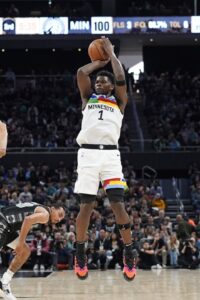 After spending much of his first two seasons playing small forward, Edwards primarily played shooting guard in 2022/23 and had a career year, averaging 24.6 points, 5.8 rebounds, 4.4 assists and 1.6 steals on .459/.369/.756 shooting in 79 regular season games (36.0 MPG). The top overall pick of 2020 was named an All-Star for the first time this season.
After spending much of his first two seasons playing small forward, Edwards primarily played shooting guard in 2022/23 and had a career year, averaging 24.6 points, 5.8 rebounds, 4.4 assists and 1.6 steals on .459/.369/.756 shooting in 79 regular season games (36.0 MPG). The top overall pick of 2020 was named an All-Star for the first time this season.
Edwards has been durable, has improved nearly across the board in each of his three seasons, is arguably the best athlete in the class, and is only 21 years old. The fact that the Wolves were able to stay afloat with Karl-Anthony Towns missing most of the season is a testament to Edwards’ growth, and there’s still plenty of room for improvement.
LaMelo Ball, G, Hornets
The 2020/21 Rookie of the Year was an All-Star in year two after averaging 20.1 points, 6.7 rebounds, 7.6 assists and 1.6 steals on .429/.389/.872 shooting in 75 games (32.3 MPG). Ball, the third overall pick in 2020, followed that up by averaging 23.3 points, 6.4 rebounds, 8.4 assists and 1.3 steals on .411/.376/.836 shooting in ’22/23.
The problem was, Ball sustained multiple left ankle sprains and then fractured his right ankle on a non-contact play at the end of February, which limited him to 36 games this season.
I highly doubt those ankle injuries will impact his next contract, though they are a little worrisome. It’s possible the Hornets might push for some type of protections on the deal, but I’d be a little surprised — Ball played 75 games in ‘21/22.
Tyrese Haliburton, G, Pacers
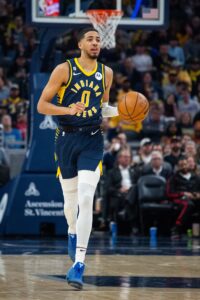 Several draft analysts had Haliburton high on their boards, but he wound up falling to the Kings at No. 12 overall. He played very well in his stint with Sacramento, but his fit with fellow point guard De’Aaron Fox was less than perfect, particularly defensively, and the Kings memorably traded him in February 2022 for a package headlined by big man Domantas Sabonis.
Several draft analysts had Haliburton high on their boards, but he wound up falling to the Kings at No. 12 overall. He played very well in his stint with Sacramento, but his fit with fellow point guard De’Aaron Fox was less than perfect, particularly defensively, and the Kings memorably traded him in February 2022 for a package headlined by big man Domantas Sabonis.
The deal has worked out well for both teams. Haliburton thrived as a full-time point guard for the Pacers to end last season, and he was outstanding in 2022/23, making his first All-Star appearance while averaging 20.7 points, 3.7 rebounds, 10.4 assists and 1.6 steals on a sparkling .490/.400/.871 shooting line in 56 games (33.6 MPG).
Advanced stats nearly universally say Haliburton has been the top player from his class through three seasons. His efficiency and excellent decision-making stand out.
The 23-year-old only averaged 2.5 turnovers per game this season, good for a 4.15-to-1 assist-to-turnover ratio – an excellent mark. Indiana went 28-28 with him in the lineup, versus 7-19 without him.
The borderline candidates
Two other first-round picks from 2020 are likely to receive massive extension offers this summer, but I’m not sure if they’ll get the full max – I could see it going either way.
Tyrese Maxey, G, Sixers
Given his relatively modest numbers as a rookie, Maxey’s enormous leap in ‘21/22 was pretty surprising (and impressive). He averaged 17.5 points, 3.2 rebounds and 4.3 assists on .485/.427/.866 shooting in 75 games (35.3 MPG) in his second NBA season. The former 21st overall pick had a strong playoff showing as well, averaging 20.8 points, 3.5 rebounds and 3.9 assists on .484/.377/.940 shooting in 12 games (40.4 MPG).
Maxey maintained his great outside shooting this season, averaging 20.3 points, 2.9 rebounds and 3.5 assists on .481/.434/.845 shooting in 60 games (33.6 MPG).
Still just 22 years old, Maxey is electric with the ball in his hands and is one of the fastest players in the league, making him a terror in transition. While he rarely turns the ball over, he’s more of a shooting guard than a point guard at this time, frequently looking to score instead of distribute.
However, he’s only 6’2″, so he can realistically only defend point guards, and he doesn’t have great instincts on that end. Most of the players listed here need to work on becoming more consistent defenders, but the other players have size advantages and are better at making plays both on and off the ball defensively.
The new CBA allows players eligible for rookie scale extensions to sign five-year deals – they were previously limited to four-year contracts. With that in mind, I think Maxey is highly likely to receive an offer in the range of $160-170MM over five years, but I’d be mildly surprised if he gets the full projected $200MM+ due to his limitations as a play-maker and defender (whether he accepts less than a max deal is another story).
Desmond Bane, G/F, Grizzlies
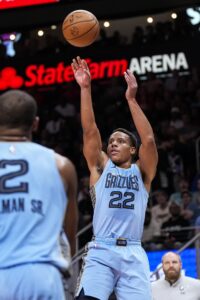 A four-year college player out of TCU, Bane was the last pick of the first round in 2020. He had a quality rookie season, mostly off the bench, averaging 9.2 points and 3.1 rebounds on .469/.432/.816 shooting in 68 games (17 starts, 22.3 MPG).
A four-year college player out of TCU, Bane was the last pick of the first round in 2020. He had a quality rookie season, mostly off the bench, averaging 9.2 points and 3.1 rebounds on .469/.432/.816 shooting in 68 games (17 starts, 22.3 MPG).
Like Maxey, Bane emerged as one of the most improved players in the league last season, averaging 18.2 points, 4.4 rebounds, 2.7 assists and 1.2 steals on .461/.436/.903 shooting in 76 games (29.8 MPG). He was even better in ‘22/23, putting up 21.5 PPG, 5.0 RPG, 4.4 APG and 1.0 SPG on .479/.408/.883 shooting in 58 games (31.7 MPG).
From a statistical standpoint, the 24-year-old has a legitimate argument for getting a max deal. He’s an elite shooter and is a solid play-maker and defender.
My only real questions as far as a max deal are: Can Bane be one of the best players on a championship-level team? Is he good enough at creating his own shot? I did view Memphis as a legitimate contender this year until Steven Adams and Brandon Clarke went down with injuries.
Bane is already an excellent player who has shown consistent improvement year over year. Every team in the league would love to have him. I’m just not totally sold on a full max, though I wouldn’t be surprised if he gets it, and it’s hard to say he hasn’t earned it.
If and when Miles Bridges signs his next contract, he’ll be required to serve a 10-game suspension before he suits up again, the NBA announced today in a press release (Twitter link).
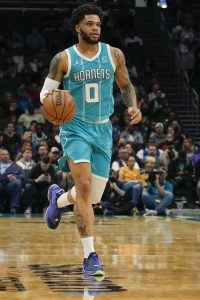 The suspension is the result of a domestic violence incident that occurred in June 2022. Bridges, who was on track to be one of the top free agents in the class of ’22, was arrested and charged with felony domestic abuse just days before his rookie contract expired. He was accused of assaulting his then-girlfriend in front of their two children.
The suspension is the result of a domestic violence incident that occurred in June 2022. Bridges, who was on track to be one of the top free agents in the class of ’22, was arrested and charged with felony domestic abuse just days before his rookie contract expired. He was accused of assaulting his then-girlfriend in front of their two children.
Bridges eventually worked out a plea deal with prosecutors in Los Angeles County in the fall, agreeing to plead no contest to one charge of felony domestic violence while two child abuse counts were dismissed. The 25-year-old avoided jail time by accepting three years of probation. He was ordered to attend a year’s worth of domestic violence counseling sessions and parenting classes in addition to completing 100 hours of community service.
The NBA conducted its own investigation into the incident, reviewing “all available matters and interviewing numerous third-party witnesses, as well as the parties involved,” the league said in today’s statement. NBA investigators also consulted with a group of domestic violence experts as part of the process.
Having concluded its probe, the league technically classifies its penalty for Bridges as a 30-game suspension. However, the NBA will consider the forward to have already served 20 of those games, since he remained unsigned for the entire 2022/23 season due to his legal situation. Typically, players can’t begin serving suspensions until they’re under contract.
Bridges received a qualifying offer from the Hornets last summer, making him a restricted free agent, and he’ll be restricted again this offseason if Charlotte reissues that QO (which was worth roughly $7.9MM).
A report in December suggested the Hornets and Bridges were making some progress in negotiations on a new contract, but the team issued a statement in January denying that claim. President of basketball operations Mitch Kupchak has since spoken multiple times about waiting for the NBA to conclude its investigation before taking any next steps.
We covered 11 of the significant in-season deals of 2022/23 in our trade breakdown series. Here’s a rundown of the six other trades that occurred in January and February.
Noah Vonleh salary dump
On January 5:
- The Spurs acquired Noah Vonleh and cash ($1.5MM)
- The Celtics acquired the Spurs’ 2024 second-round pick (top-54 protected)
Entering 2022/23, the Spurs were one of two teams with a significant amount of cap room available, making them a prime target for salary dumps. That’s all this trade boiled down to for the Celtics.
By trading Vonleh before his salary became guaranteed, the Celtics not only removed his $1.16MM cap hit and saved $7.15MM toward their luxury tax bill, but they also freed up a roster spot. It also minimized the amount of cash they had to send out to make the deal – if they had waited a few more days, Vonleh’s cap hit would have increased to $1,836,090, which is the standard amount for all veterans on one-year, minimum-salary contracts.
The Celtics still technically paid Vonleh all but two days of the prorated minimum salary he received this season — the Spurs paid the final two days after acquiring and waiving him. Removing him from the books was purely about the financial impact, as he was a deep-bench reserve who seldom played (in 23 games, he averaged just 7.4 minutes per contest).
Boston also created a traded player exception equivalent to Vonleh’s salary since it didn’t receive a player in return.
Vonleh did not catch on with another team after the trade and the 27-year-old big man will still be an unrestricted free agent this summer.
The pick the Spurs sent out is extremely unlikely to convey — they just had to send something back in return. They also waived – and later re-signed – center Gorgui Dieng as part of this trade, which moved them marginally closer to the salary cap floor.
Essentially, they net gained about $339K in cash as part of the deal and were able to keep Dieng around as a veteran leader after he cleared waivers .
Dewayne Dedmon salary dump
On February 7:
- The Spurs acquired Dewayne Dedmon and the Heat’s 2028 second-round pick
- The Heat acquired cash ($110K).
Another salary dump, this time for the Heat. Dedmon had fallen out of Miami’s rotation – he had been dealing with plantar fasciitis, and was suspended one game for a sideline incident that saw him swat a Theragun (a massage device) onto the court out of anger after being subbed out.
Removing Dedmon’s $4.7MM cap hit gave the Heat the financial flexibility to sign a couple of frontcourt reinforcements — Kevin Love and Cody Zeller — while still remaining below the luxury tax line. They already had one open roster spot and removing Dedmon freed up a second, so they didn’t have to release anyone to add the two veterans.
As with Boston, Miami also generated a TPE equal to Dedmon’s salary since the team didn’t acquire a player in return.
As previously mentioned, the Spurs had ample cap room available and used more of it to add and then waive Dedmon (who signed with the Sixers but rarely plays), acquiring a second-round pick in the process. They only sent out $110K to complete the transaction, which is the minimum amount a team can send or receive in a trade in ‘22/23.
Kessler Edwards salary dump
On February 7:
- The Kings acquired Kessler Edwards and cash ($2.58MM)
- The Nets acquired the draft rights to David Michineau
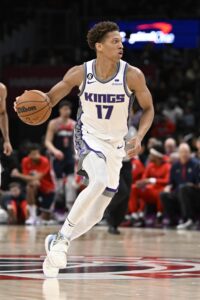 Another minor trade, this time a salary dump for the Nets. The primary difference is the Kings actually kept Edwards instead of immediately waiving him.
Another minor trade, this time a salary dump for the Nets. The primary difference is the Kings actually kept Edwards instead of immediately waiving him.
Brooklyn saved about $8MM in salary and luxury tax payments by moving Edwards, a 2021 second-round pick out of Pepperdine. He showed some promise as a rookie, but only played 27 minutes for the Nets this season.
As a second-year player on a minimum-salary contract, Edwards is earning $1,637,966 in ‘22/23. That’s the amount of the TPE the Nets created in this deal. Michineau is currently playing in Italy and every year he remains overseas, he’s less likely to ever be brought stateside.
Still just 22 years old, Edwards has been a rotation member over the past month for Sacramento, averaging 3.9 points and 2.0 rebounds on .435/.349/.769 shooting in 22 games (13.9 minutes). The Kings will have a $1.93MM team option on Edwards for ‘23/24 if they want to bring him back – considering he was getting rotation minutes down the stretch, I’d be mildly surprised if they don’t exercise it.
Rockets/Hawks four-player deal
On February 9:
- The Rockets acquired Justin Holiday, Frank Kaminsky and the Thunder’s 2024 and 2025 second-round picks
- The Hawks acquired Garrison Mathews and Bruno Fernando
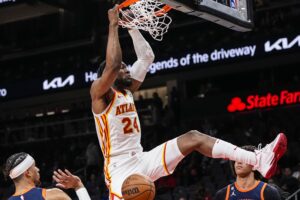 This trade (understandably) flew under the radar a bit due to all the blockbusters on deadline day, but it was pretty interesting for both sides because it was more complicated than it appears on the surface.
This trade (understandably) flew under the radar a bit due to all the blockbusters on deadline day, but it was pretty interesting for both sides because it was more complicated than it appears on the surface.
For example, the Hawks were able to treat this as essentially three separate trades rolled into one. They acquired Mathews with an existing TPE, did a simultaneous trade of Kaminsky for Fernando, and then a non-simultaneous trade of Holiday, which allowed them to create a new mid-sized outstanding trade exception of $6,292,440, equal to Holiday’s outgoing cap charge.
Both Mathews (26) and Fernando (24) are young and have played some solid basketball across their four NBA seasons, and their contracts are affordable. However, neither played much for the Hawks, and their salaries are non-guaranteed for ’23/24, so it’s certainly not a given that they’ll be back next season.
The primary purpose of the deal was to clear enough salary cap space to remain below the luxury tax line. Atlanta used that extra breathing room to acquire Saddiq Bey – a third-year forward who has become a key bench contributor – with a separate trade exception.
The Rockets could not complete this as a straight two-for-two simultaneous trade, as the amount of incoming money from Holiday and Kaminsky was greater than 175% of Mathews’ and Fernando’s salaries (plus $100K). Instead, they treated it as a simultaneous trade for Holiday and used the minimum salary exception to acquire Kaminsky.
Houston’s primary motivation was to acquire the two second-round picks from the Thunder, which Atlanta controlled from a previous trade. OKC is on an upward trajectory, so it’s hard to say where those picks might land, but it was solid value for taking on about $4MM in added salary.
The Rockets reportedly had interest in retaining both veterans, but Holiday wound up seeking a buyout and caught on with the Mavericks. Both Holiday and Kaminsky will be unrestricted free agents this summer.
Mike Muscala to Boston
On February 9:
- The Celtics acquired Mike Muscala
- The Thunder acquired Justin Jackson, a 2023 second-round pick and Boston’s 2029 second-round pick
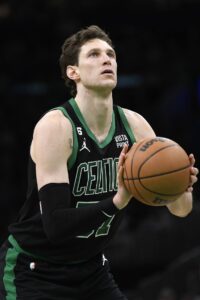
A classic win-now move from a championship contender, which Boston certainly is. A long-range shooting specialist, Muscala has shot a combined 40.8% from deep over the past two seasons, averaging 6.9 PPG and 3.1 RPG in 14.5 MPG over that span (106 games).
Adding another big man shooter allows the Celtics to play a five-out system to maximize floor spacing for drives, kick-outs, and swinging the ball around to find the open man. He’s also on a relatively affordable $3.5MM contract with an identical team option for ‘23/24 – it’s important to find value on the cheap for any team, but particularly taxpayers like Boston.
You could say this deal is sort of connected to the aforementioned salary dump of Vonleh, since the Celtics added about $6.4MM to their tax bill by swapping out Jackson’s minimum-salary contract for Muscala. The Celtics had to use a trade exception left over from last year’s trade deadline to acquire him, as Jackson’s cap hit wasn’t large enough to match his incoming salary (they also created another small trade exception equivalent to Jackson’s salary).
While Muscala is far from a defensive stopper, his teams have actually been better on that end with him on the court in each of the past three seasons. The 31-year-old is not a rim protector nor a great rebounder, so those numbers may be a little noisy due to primarily playing against reserves.
The Thunder added Jackson (and then immediately waived him) using the minimum salary exception, generating a new trade exception equivalent to Muscala’s $3.5MM salary. They also added a couple of second-round picks, which is solid value given Muscala’s modest role — as the youngest team in the league, it’s not like Muscala was in OKC’s long-term plans, even if he was a steady veteran presence who contributed on the court as well.
Interestingly, the 2023 second-rounder heading to OKC is still up in the air and won’t be determined until next month’s draft lottery, because the Rockets finished the season tied with the Spurs for the NBA’s second-worst record – whichever team selects earlier in the lottery will have the less favorable second-round pick.
If Houston’s second-round pick lands at No. 32, the Thunder will receive the Heat’s second-rounder (via Boston), but if it lands at No. 33, OKC will receive Portland’s second-rounder (via Boston).
There’s a substantial difference in value between those two second-rounders – the Blazers’ pick will land at No. 35, while the Heat’s will be between Nos. 48-50 (pending the results of a three-team tiebreaker). Clearly, the Thunder will be hoping that Houston drafts ahead of San Antonio in the first round, though I’m sure they’d rather not see either of their conference rivals land the No. 1 overall pick and the chance to select Victor Wembanyama.
Mason Plumlee to the Clippers
On February 9:
- The Clippers acquired Mason Plumlee
- The Hornets acquired Reggie Jackson, the Clippers’ 2028 second-round pick, and cash ($1MM).
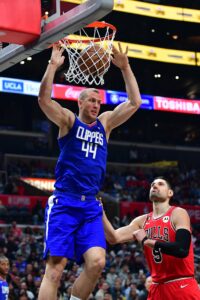 Another relatively modest win-now deal, this time for the Clippers, who had been looking for reliable center depth leading up to the deadline and found it in Plumlee, a 10-year veteran who was surprisingly having the best season of his career for Charlotte at age 32.
Another relatively modest win-now deal, this time for the Clippers, who had been looking for reliable center depth leading up to the deadline and found it in Plumlee, a 10-year veteran who was surprisingly having the best season of his career for Charlotte at age 32.
In 56 games with the Hornets, all starts, he posted career highs in several categories, including field-goal percentage (66.9%), points (12.2), rebounds (9.7), assists (3.7) and minutes per game (28.5). His playing time has dipped since he joined the Clippers, which is understandable because he’s playing behind Ivica Zubac – he averaged 7.5 points, 6.9 rebounds and 1.7 assists in 23 games (four starts, 19.9 minutes).
Plumlee’s expiring salary made him a natural trade candidate, particularly since the Hornets have drafted multiple centers in the past few years and had a disappointing 2022/23 season due in part to off-court issues and injuries. Jackson was reportedly a positive locker-room presence, but he was struggling for the second straight season and the Clippers only had to give up one second-rounder and some cash to complete the deal.
Plumlee has some limitations (he’s a non-shooter and a below-average defender), but he plays hard, sets solid screens, and generally is in the right spots. The Clippers will have his Bird rights if they want to re-sign him this summer.
L.A. also generated a small ($2,134,843) trade exception as part of the deal, which was the difference in Jackson’s ($11,215,260) and Plumlee’s ($9,080,417) salaries. While the Clippers did save some money here, they actually added to their tax bill with their other trades (acquiring Bones Hyland and Eric Gordon in separate deals).
One rumor leading up to the deadline indicated the Hornets were looking for a first-round pick for Plumlee, but I didn’t view that as realistic – he’s mostly been a backup, and while his contract isn’t unreasonable, it’s also expiring, so he could be a rental player. They also received some cash as part of the deal to help offset the aforementioned salary differences.
Jackson subsequently reached a buyout and signed with Denver, so clearly the primary motivation for Charlotte was extracting whatever draft capital it could in return for Plumlee. I’m sure giving the team’s young centers more minutes was a motivating factor as well, but president of basketball operations Mitch Kupchak said after the deadline that he was concerned about having so many free agents due to the uncertainty of what it will take to re-sign them.
The Hornets gave backup center Nick Richards a three-year, $15MM extension last month, so both he and rookie starter Mark Williams will be under team control for at least three more seasons.